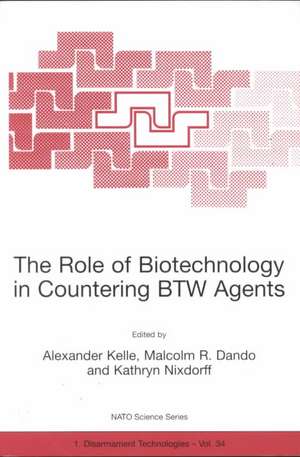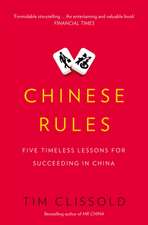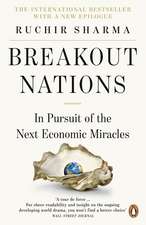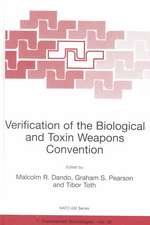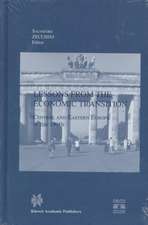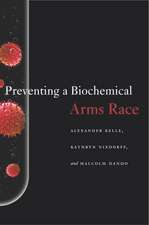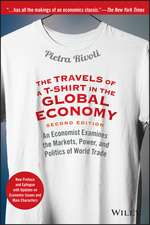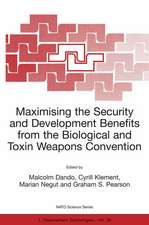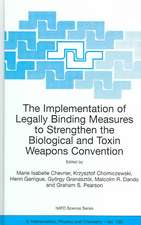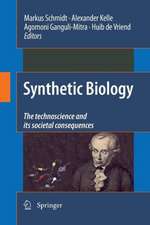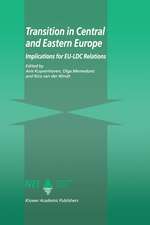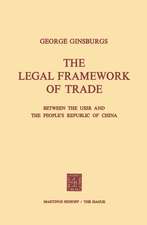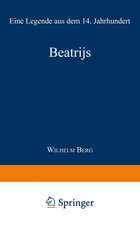The Role of Biotechnology in Countering BTW Agents: NATO Science Partnership Subseries: 1, cartea 34
Editat de Alexander Kelle, Malcolm R. Dando, Kathryn Nixdorffen Limba Engleză Paperback – 31 mar 2001
The role of biotechnology in countering biological and toxin weapons is here addressed under seven major headings:
- The wider political and economic contexts;
- Enabling technologies for BTW agent detection;
- The applicability of biotechnological methods for BTW agent detection on the battlefield, in a terrorist incident, and in an inspection environment;
- Pre-exposure medical countermeasures;
- Diagnosis and identification;
- Post-exposure treatment and decontamination;
- Contribution of biotechnology to strengthening international conventions against BTW agents.
Din seria NATO Science Partnership Subseries: 1
- 15%
 Preț: 643.65 lei
Preț: 643.65 lei - 18%
 Preț: 949.23 lei
Preț: 949.23 lei - 18%
 Preț: 951.14 lei
Preț: 951.14 lei - 18%
 Preț: 950.96 lei
Preț: 950.96 lei - 18%
 Preț: 1226.42 lei
Preț: 1226.42 lei -
 Preț: 392.97 lei
Preț: 392.97 lei - 18%
 Preț: 944.36 lei
Preț: 944.36 lei - 18%
 Preț: 1227.04 lei
Preț: 1227.04 lei - 18%
 Preț: 1220.26 lei
Preț: 1220.26 lei - 18%
 Preț: 947.35 lei
Preț: 947.35 lei - 18%
 Preț: 952.09 lei
Preț: 952.09 lei - 18%
 Preț: 955.56 lei
Preț: 955.56 lei - 15%
 Preț: 643.65 lei
Preț: 643.65 lei - 18%
 Preț: 947.67 lei
Preț: 947.67 lei - 18%
 Preț: 1111.97 lei
Preț: 1111.97 lei - 18%
 Preț: 1230.66 lei
Preț: 1230.66 lei - 5%
 Preț: 2125.27 lei
Preț: 2125.27 lei - 15%
 Preț: 650.86 lei
Preț: 650.86 lei - 18%
 Preț: 949.23 lei
Preț: 949.23 lei - 15%
 Preț: 640.37 lei
Preț: 640.37 lei - 15%
 Preț: 650.37 lei
Preț: 650.37 lei - 18%
 Preț: 1225.16 lei
Preț: 1225.16 lei -
 Preț: 391.40 lei
Preț: 391.40 lei - 18%
 Preț: 945.14 lei
Preț: 945.14 lei - 5%
 Preț: 1407.87 lei
Preț: 1407.87 lei -
 Preț: 398.15 lei
Preț: 398.15 lei
Preț: 390.46 lei
Nou
Puncte Express: 586
Preț estimativ în valută:
74.71€ • 77.86$ • 61.86£
74.71€ • 77.86$ • 61.86£
Carte tipărită la comandă
Livrare economică 03-17 aprilie
Preluare comenzi: 021 569.72.76
Specificații
ISBN-13: 9780792369066
ISBN-10: 0792369068
Pagini: 336
Ilustrații: 336 p.
Dimensiuni: 160 x 240 x 18 mm
Greutate: 0.47 kg
Ediția:Softcover reprint of the original 1st ed. 2001
Editura: SPRINGER NETHERLANDS
Colecția Springer
Seria NATO Science Partnership Subseries: 1
Locul publicării:Dordrecht, Netherlands
ISBN-10: 0792369068
Pagini: 336
Ilustrații: 336 p.
Dimensiuni: 160 x 240 x 18 mm
Greutate: 0.47 kg
Ediția:Softcover reprint of the original 1st ed. 2001
Editura: SPRINGER NETHERLANDS
Colecția Springer
Seria NATO Science Partnership Subseries: 1
Locul publicării:Dordrecht, Netherlands
Public țintă
ResearchCuprins
Section I: Political and Economic Dimensions of Countering BTW Agents and Strenghtening the BTW Control Regime.- Dealing With a Headache: Three Scenarios and Two Dilemmas.- Countering Biological Warfare: An Overview.- Lessons of the Chemical Weapons Convention for the BTWC Protocol.- Biotechnology and the Strengthening of the BTWC: The View from West European Industry.- Strengthening the BTWC through R&D Restructuring: The case of the State Research Center of Virology and Biotechnology “VECTOR”.- Dissolution of the Soviet Union, Introduction of a Market Economy and the Future BTWC Compliance Protocol: Impact on the Russian Biotechnology Industry.- Section II: Biotechnology in BTW Agent Detection: Underlying Technologies.- The Potential of Different Biotechnology Methods in BTW Agent Detection. Antibody Based Methods.- The Potential of Different Biotechnology Methods in BTW Agent Detection. DNA Methods: Gene Probes.- The Role of Biotechnology in BTW Agent Detection. DNA Methods: Polymerase Chain Reaction.- Detection of Biological Agents and Biosensor Design.- Section III: Biotechnology and BTW Agent Detection in Different Environments.- Detecting BTW Agents on the Battlefield.- Detecting Biological Terrorism. Evaluating the Technologies.- Detecting Biological and Toxin Weapon Agents in an Inspection Environment Graham.- Section IV: The Role of Biotechnology in the Pre-Exposure Treatment of BTW Agents.- Possibilities and Limitations of Vaccination.- The Development of an Oral Vaccine Against Anthrax.- Vaccine Production.- Section V: The Role of Biotechnology in Diagnosis and Identification of BTW Agents.- The Role of Biotechnology in Protection against BTW Agents — Overview from a Medical Point of View and Identification of the Symptoms.- Medical Countermeasures toBiological Warfare Agents.- Section VI: The Role of Biotechnology in Protection Against BTW Agents: Post-Exposure Treatment.- Treatment of Mass Casualties under Worst Case Assumptions.- The Post Exposure Prophylactic Measures Against Viral BTW Agents.- Search of Biotechnology-based Decontaminants for C/BW Agents.- Section VII: The Impact of Biotechnology on Politico-Military and Normative Efforts to Counter BTW Agents.- Biotechnology and Politico-Military Responses to BTW Agents.- Biotechnology and the Development of Norms Against BTW Agents.
